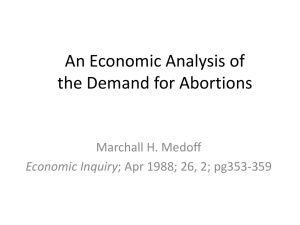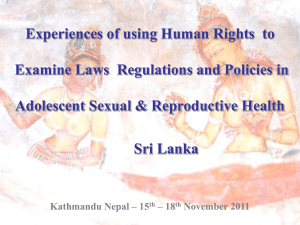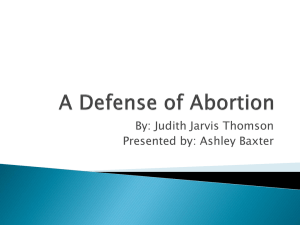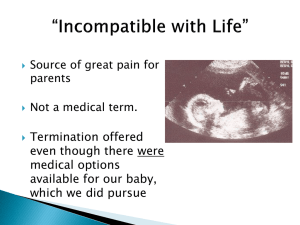kuwait - the United Nations
advertisement
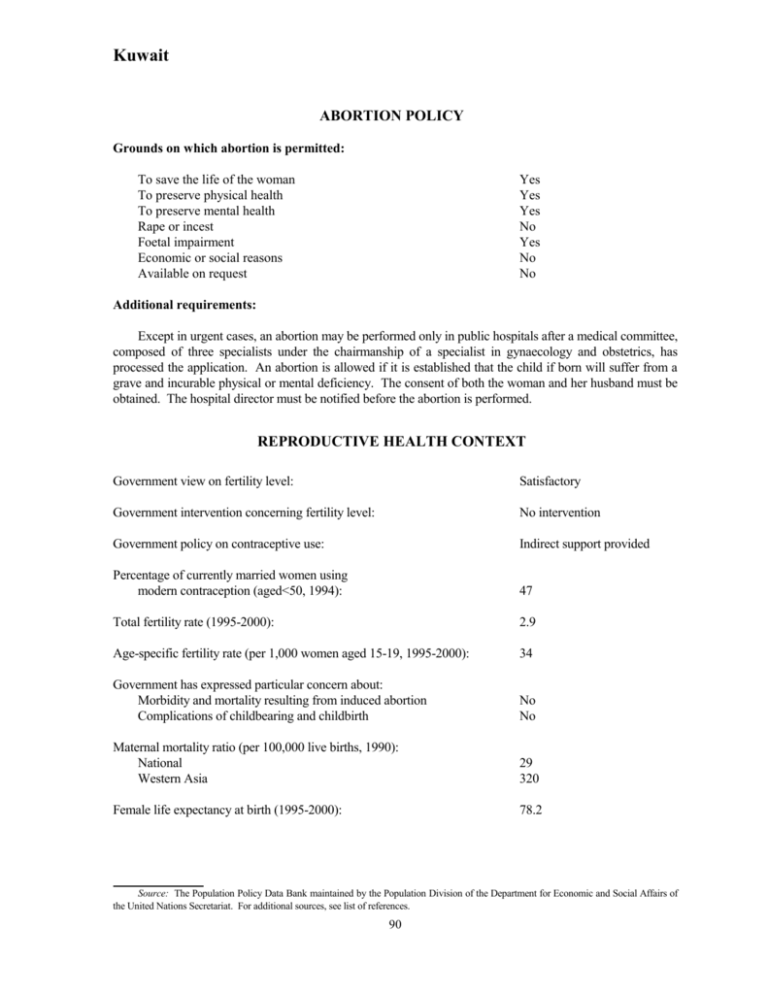
Kuwait ABORTION POLICY Grounds on which abortion is permitted: To save the life of the woman To preserve physical health To preserve mental health Rape or incest Foetal impairment Economic or social reasons Available on request Yes Yes Yes No Yes No No Additional requirements: Except in urgent cases, an abortion may be performed only in public hospitals after a medical committee, composed of three specialists under the chairmanship of a specialist in gynaecology and obstetrics, has processed the application. An abortion is allowed if it is established that the child if born will suffer from a grave and incurable physical or mental deficiency. The consent of both the woman and her husband must be obtained. The hospital director must be notified before the abortion is performed. REPRODUCTIVE HEALTH CONTEXT Government view on fertility level: Satisfactory Government intervention concerning fertility level: No intervention Government policy on contraceptive use: Indirect support provided Percentage of currently married women using modern contraception (aged<50, 1994): 47 Total fertility rate (1995-2000): 2.9 Age-specific fertility rate (per 1,000 women aged 15-19, 1995-2000): 34 Government has expressed particular concern about: Morbidity and mortality resulting from induced abortion Complications of childbearing and childbirth No No Maternal mortality ratio (per 100,000 live births, 1990): National Western Asia 29 320 Female life expectancy at birth (1995-2000): 78.2 Source: The Population Policy Data Bank maintained by the Population Division of the Department for Economic and Social Affairs of the United Nations Secretariat. For additional sources, see list of references. 90 Kuwait BACKGROUND Before 1981, abortion was generally illegal in Kuwait under the Penal Code (Law No. 16 of 2 June 1960). A person who performed an abortion on a pregnant woman was subject to up to 10 years’ imprisonment and payment of a fine, and a pregnant woman who carried out her own abortion or allowed one to be performed was subject to up to five years’ imprisonment and/or payment of a fine. Physicians, pharmacists and midwives who committed the offence were liable to harsher penalties. Abortions were permitted to be performed only for the good faith purpose of saving the life of the pregnant woman by a person in possession of the necessary skills. These penalties are still applicable in the case of illegally performed abortions. With the enactment of Law No. 25 of 1981, Kuwait became one of the first countries in Western Asia to permit abortion on less restrictive grounds. If the pregnancy is of less than four months’ duration, an abortion can be performed if the continuation of the pregnancy would cause serious injury to health, or if it is established that the foetus would be born with a serious physical or mental malformation that cannot be expected to be cured. Except in urgent cases, the abortion must be performed in a State hospital and must be approved by a medical commission consisting of three specialized physicians, one of whom is a specialist in gynaecology and obstetrics Ministerial Decree No. 55 of 1984 was issued to implement the law of 1981. It requires that an abortion be performed in a public hospital which has a gynaecology and obstetrics department. If the woman is not already at the public hospital nearest her usual residence, she is to be referred to it and is to bring a detailed report of her case signed by her physician and the reasons for the requested abortion. In the event that the woman cannot be transferred to the nearest government hospital without endangering her life, an abortion may be performed in a private hospital that is approved by the Ministry of Public Health. The decision of the commission that approves the abortion must be unanimous. All members of the commission must be of the Islamic faith. The hospital director must be notified before the abortion is performed. The consent of the pregnant woman and her husband or, in the absence of the latter, of any person standing in loco parentis. is required. This foregoing procedure does not apply in cases of inevitable, incomplete, septic or retarded abortions, or in cases of extra-uterine or ovarian pregnancy. Although Ministerial Decree No. 55 of 1984 requires that the Ministry of Public Health should be notified of all abortions performed, no comprehensive data on the incidence of abortion and on mortality due to abortion are readily available. The Government does not consider the level of induced abortion and complications associated with induced abortion to be a matter of concern. Maternal mortality associated with abortion is negligible. No family planning programme is active in Kuwait. The Government provides incentives for childbearing among Kuwaiti nationals. However, access to contraceptive methods is permitted. In practice, contraceptives and family planning advice are available in the free government health clinics. Source: The Population Policy Data Bank maintained by the Population Division of the Department for Economic and Social Affairs of the United Nations Secretariat. For additional sources, see list of references. 91
